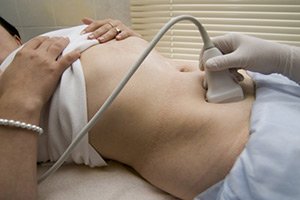ADDRESS:
Degtyarevskaya st., 48
Kyiv
RECEPTION OF PATIENTS:
Mon-Fri 8:00-18:00
Sat 9:00-18:00
[ivory-search id="15340" ]
Address
Kyiv,
Degtyarevskaya st., 48
Opening hours
Mon-Fri 8:00-18:00
Sat 9:00-18:00
Sun – day off
ADDRESS:
Degtyarevskaya st., 48
Kyiv
RECEPTION OF PATIENTS:
Mon-Fri 8:00-18:00
Sat 9:00-18:00
Address
Kyiv,
Degtyarevskaya st., 48
Opening hours
Mon-Fri 8:00-18:00
Sat 9:00-18:00
Sun – day off
Home » Diagnostics » Ultra Sound Diagnosis » Ultrasonography of the kidneys and bladder

Ultrasound examination of organs related to the urinary system of the body is a quick, painless for the patient and maximally informative for the doctor diagnostic method. In a short period of time, a specialist can determine changes in the structure and size of the kidneys, ureters, and bladder, which may be the first signs of ongoing diseases.
Ultrasound scanning of the pelvic organs in the first place will show, whether there are deviations in the location of the kidneys, their size and contours, what is the thickness of the walls of the bladder and whether sand or urine accumulates in it. And also will allow to visualize stones, cysts or tumor neoplasms. But this is not all the possibilities of ultrasound scanning. This common and accessible diagnostic method provides the physician with data that is not available even for laboratory studies.
Due to the ease in carrying out and absolute safety, the procedure of ultrasound can be performed repeatedly, especially as a control over medicamental or surgical treatment. This manipulation is also applicable for diagnosis of young children.
Ultrasound of the kidneys, usual blood and urine tests will be recommended to the patient in the case of:
Ultrasound scanning of the kidneys and adrenal glands is mandatory as a preparation for the planned operation or diagnosis of the organ after its transplantation.
Along with its simplicity and ease, ultrasound examination of the kidneys allows us to determine serious and hidden pathologies in the development of the organ. The methodology defines:
The ultrasound of the ureters and the bladder also allows to evaluate:
Preparation to the test is not difficult, but still requires compliance with some recommendations. 3 days before the date of the study, the patient is asked to exclude foods that provoke gas formation from the diet. Among them: rye bread, cabbage, peas, milk and all sour-milk products, sweet and flour, plums and grapes. The gut-filled intestine will prevent the penetration of ultrasonic waves, and the monitoring results will be inaccurate.
From the other side, for an hour and a half before the procedure the patient will have to drink about 1-1.5 liters of water, and definitely come to the examination in a full bladder.
Men and women, ultrasound of the kidneys and adrenal glands is carried out in the same way — in a transabdominal way, with a complete bladder. The man uncovers the upper part of the body and puts his back on the medical couch. The diagnostic examines the organs by placing an ultrasound scanner on the anterior abdominal wall.
The doctor can then ask the patient to roll over on the stomach and continue the study through the back. If necessary, especially if the patient suffers from a problem of excess weight, the kidneys are inspected in different planes, even in the position on the side. Do not be surprised if the doctor asks you to stand up, take a deep breath or exhale.
In most cases, during the ultrasound of the bladder, the diagnostician examines the area above the pubic bone of the patient. The first half of the examination is performed with a complete bladder.
At the end of the ultrasound scan of the kidneys and bladder the doctor will ask the patient to go to the toilet. Then the study will continue, and the specialist will estimate the volume of residual urine.
On average, the procedure will take the patient about 15-20 minutes.
Advantages of ultrasound of the kidneys and bladder in the center of progressive medicine «AVICENNA MED»
To register for ultrasound of the kidneys and bladder in the Center for Progressive Medicine «AVICENNA MED» you can call:
The use of content and photo materials of the site without the consent of the copyright holder is not allowed!
License – order of the Ministry of Health of Ukraine dated June 1, 2017. No. 592
License for Dentistry – order of the Ministry of Health of Ukraine dated December 15, 2022 No. 2270
© 2025 | AVICENNA MED – center for Pronovative Medicine. Kyiv, Ukraine
License – order of the Ministry of Health of Ukraine dated June 1, 2017. No. 592
License for Dentistry – order of the Ministry of Health of Ukraine dated December 15, 2022 No. 2270
The use of content and photo materials of the site without the consent of the copyright holder is not allowed!
© 2025 | AVICENNA MED – center for Pronovative Medicine. Kyiv, Ukraine

Please fill out the form below and we will call you back within 30 minutes, or give us a call at one of our phone numbers.
Mon-Fri 8:00-18:00
Sat 9:00-18:00
Sun – day off
The use of content and photo materials of the site without the consent of the copyright holder is not allowed!
© 2017-2025 | “AVICENNA MED – center for Pronovative Medicine. Kyiv, Ukraine
License – order of the Ministry of Health of Ukraine dated June 1, 2017. No. 592